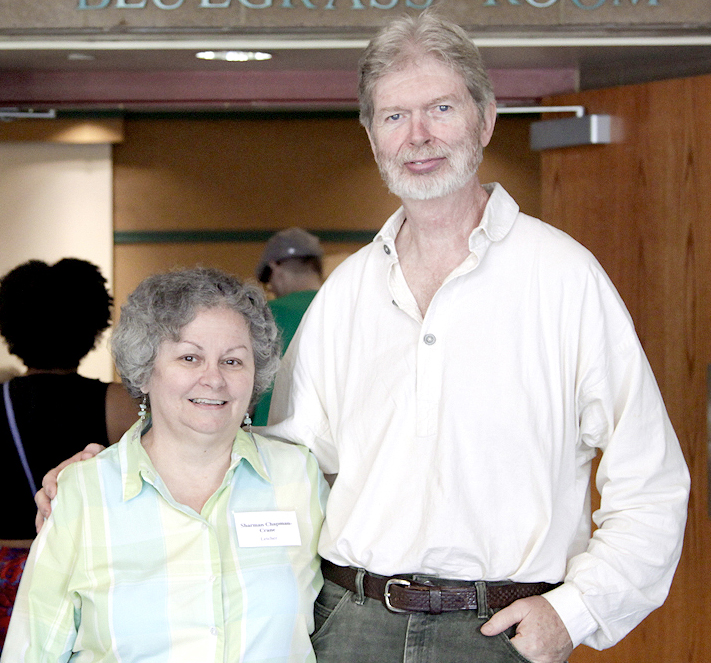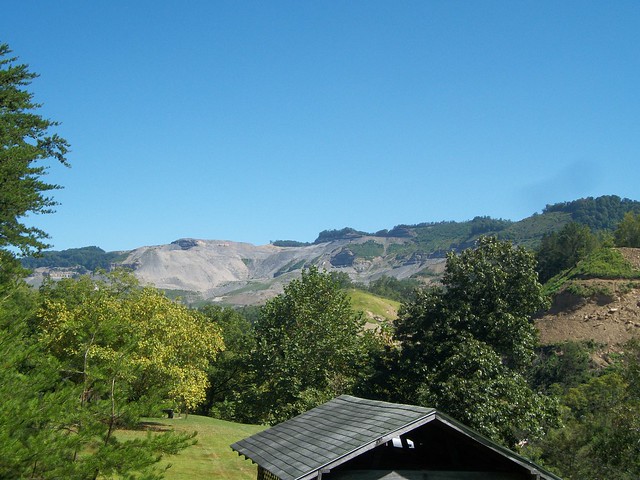A Day in the Belly of the Beast
President Trump has stopped a federal study looking at the relationship between strip mining and human health. Despite that, a planned hearing took place in Hazard on August 21 and in Lexington on August 22. Jeff Chapman-Crane read the following that he and Sharman, his wife, had written together.
6:45 a.m. You wake up. The first sounds you hear are the machines…the dozers, the end loaders, the massive dump trucks … Black Mountain being ravaged … The first shift change at the mine begins.
You take your asthma medicine, maybe your inhaler if the stress triggers an attack. You wake your son, who gets up coughing from the dust, or the smell of the water, or who knows what. You try not to think about long-term consequences.
 You dress, start your routine … breakfast, vitamins, exercise. You wash the dishes, then brush your teeth, trying not to think about why the water is so cloudy and smells so bad.
You dress, start your routine … breakfast, vitamins, exercise. You wash the dishes, then brush your teeth, trying not to think about why the water is so cloudy and smells so bad.
You sit down to plan the day … a trip to town, work in the studio, mowing the grass. A college group to tour the gallery later.
You’re startled by the first explosion, which you feel before you hear it. The house shakes, the windows rattle … then the roar of the explosives and the cloud of dust. You remember the four-year old in Virginia, killed by a boulder crashing through his bedroom, or the people injured in Hazard when fly rock came through the roof of the Walmart. You try not to think about it.
You work in the studio, and later you and your son begin the mowing. This time you hear the explosion before you feel it. You run toward the house as the valley fills with dust. Your eyes sting and your mouth and nose fill with grit. You make it inside, close all the doors and windows. You’re scared and angry, you want to file some kind of complaint. Then you remember the government official telling victims of a sludge spill, “Don’t worry, there’s nothing in the sludge that’s not on the periodic table of elements.” Or the elected representative saying to you, “Might as well let them get all the coal they can, they’re just going to build a big dam and flood all of eastern Kentucky anyway.” Deaf ears … You wait for the dust to settle. The second shift change begins.
You start to town, passing your best friend’s house, and try not to think of how strained that friendship has become. You start across Pine Mountain, dreading the encounter with trucks loaded with 200,000 pounds of coal, and you hope the driver is not high on oxycontin, or driving too fast, or both. By grace you arrive safely and stop at the courthouse to get car tags. “Would you like a Friends of Coal tag, or maybe a Friends of Coal tee-shirt?” No thanks. Next stop, the bank, where the tellers all wear Coal Mining Our Future tee-shirts. You muse for a moment about the unintended irony but keep it to yourself. As you head to Food City you read the sticker on the truck in front of you… “Save a Nation, Kill a President.” In the parking lot a dozen cars with Friends of Coal, Coal Keeps the Lights On, Coal Mining Our Future tags and stickers … then the pick-up with the fully equipped gun rack, and you hope the owner is not crazy enough to enact the message on his bumper: “Save a Coal Miner, Shoot a Tree Hugger.”
You cook supper, eat, take a bath, trying not to think about the water. You go to the gallery. Dave Cooper brings a group of 20 students from Ohio and Harvard. You give a tour and tell your story. The students are inspired and think you’re courageous and heroic, but you know better. You do what you can. It’s not enough.
On the way back to the house you glance up at the devastation on Black Mountain, confronted once again with your failures … as if you could forget them. You settle in for the evening, a good book or maybe a video, nothing too serious, because you’re up to your neck in serious.
The night descends. You brush your teeth, trying not to think about why the water is so cloudy and smells so bad. You get into bed. The third shift change begins, miners working the only jobs available, putting their lives on the line to provide for their families. Told by the bosses that the “tree huggers” want to put them out of work and don’t care if their children starve. Miners going to and from work, one way in, one way out. They know who you are, they know where you stand, they know where you live. You try not to think about it. But you do. You think about those miners … desperate, misinformed, scared, angry. You think about the threats, veiled or explicit, real or perceived, about the poisoned water and the contaminated air, your family’s health.
You think about friends … estranged, injured, sick or dead. You think about Black Mountain, the highest in Kentucky, its beauty and vibrancy lost forever. Forever.
When the traffic diminishes a quietness settles over the valley. You begin to drift to sleep, and the last sounds you hear are the machines … the dozers, the end loaders, the massive dump trucks.
Jeff read this statement at the August 21 hearing in Hazard with the National Academy of Sciences, Engineering and Medicine. In 2016, Jeff and Sharman received KFTC’s Lifetime Achievement Award.
Recent News
Kentucky’s past legislative session showed alarming trend toward government secrecy
Churchill Downs takes more than it gives. That's why the Kentucky Derby is a no-go for me
‘We must never forget.’ Kentucky town installs markers for lynching victims.
Featured Posts
TJC Rolling Out The Vote Tour – a KFTC Reflection Essay
KFTC Voter Empowerment Contractor Reflection Essay
Voting is Power
Archives
- Home
- |
- Sitemap
- |
- Get Involved
- |
- Privacy Policy
- |
- Press
- |
- About
- |
- Bill Tracker
- |
- Contact
- |
- Links
- |
- RSS


